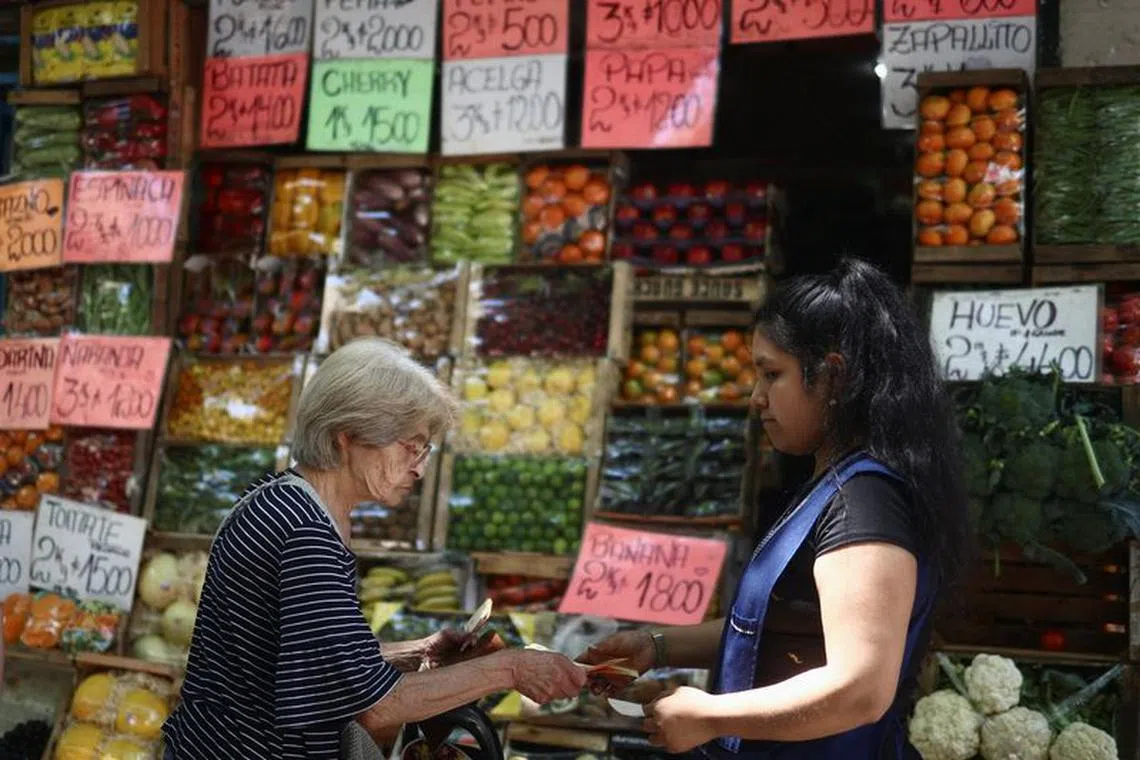Argentina’s inflation tops 160%, spotlighting challenge for President Milei
Sign up now: Get ST's newsletters delivered to your inbox

The monthly inflation was rate 12.8 per cent in November alone, statistics agency Indec said on Dec 13.
PHOTO: REUTERS
BUENOS AIRES - Argentina’s annual inflation rate hit 161 per cent in November, faster than expected and the highest monthly figure in 2023, laying bare the daunting challenges new President Javier Milei faces in navigating the country’s turbulent economic waters.
The data is the first inflation readout since Mr Milei took office
Inflation is expected to climb faster in the months ahead after Mr Milei’s government devalued the peso over 50 per cent this week, part of a wider shock package
“Last week I bought two kilos of potatoes for 800 pesos and this week it cost almost 1,200 pesos. I don’t know if next week we’ll be able to afford to buy the same groceries,” said 46-year-old bricklayer Eduardo Casado as he worked in a home in Buenos Aires on Dec 13.
Mr Facundo Marino, a 53-year-old worker in central Buenos Aires, said he backed the plan as necessary to avoid things getting worse.
But he added: “It’s a really deep shock for people’s pockets, it destroys you.”
“With the dollar at 800, bus tickets going from 50 to 500 (pesos)... everything increases,” he said. “Either you hike salaries or I don’t know what’s going to happen to the country.”
The monthly inflation was rate 12.8 per cent in November alone, statistics agency Indec said on Dec 13, above a Reuters poll that had expected an 11.8 per cent monthly bump. That was a steep jump from an 8.3 per cent rise in October.
Mr Jose Diz, an agronomic engineer, said that tough government measures were “necessary”, but the real-life impact would be difficult.
“Yesterday I was talking to my children at dinner, and it’s like being told that my salary is being cut in half,” he said, adding that his family were already tightening their belts by buying fewer groceries. He worried about people living on pensions.
Mr Milei took office promising a sharp, painful fiscal shock to fix Argentina’s economic crisis, and on Dec 12 his government announced an initial policy push that includes a more than 50 per cent devaluation of the local peso currency plus sharp spending cuts.
Those measures, however, could supercharge inflation even higher in the near-term, with Mr Milei having warned of tough times ahead and monthly inflation of 20-40 per cent in the months ahead.
Latin America’s No. 3 economy has been battling a prolonged economic crisis that has steadily eroded the value of the local currency while plunging two-fifths of the population into poverty.
Mr Milei had said that without tough measures, the country could slip into hyperinflation.
He has repeatedly said that “there is no money”, though he has pledged to protect some social spending in a bid to head off protests, with over four in 10 people already in poverty.
“There will be some harsh costs in the coming months from a deepening of stagflation,” said economist Gustavo Ber from consulting firm Estudio Ber, referring to a mixture of high inflation and recession.
Analysts say the biggest challenge to Mr Milei will be keeping a lid on social unrest. Many Argentines, weary of years of boom-bust economic crisis, seem willing for now to give him time to turn things around, but their patience likely will not last long.
Mr Casado, the bricklayer, said work was complex because prices of materials were constantly changing, and it was hard to get by.
“It’s been a while since we’ve been making ends meet,” he said, adding though that he was supportive - for now - of the government’s austerity measures, which he hoped could help.
“I want to believe prices are going to slow down at some point.” REUTERS


